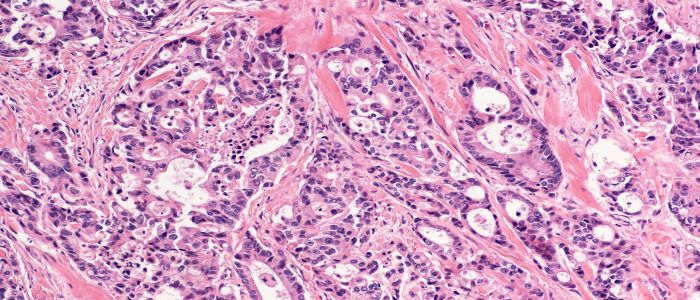New insight into early stages of bowel cancer could provide an effective treatment strategy
Published: 2 June 2021
An international team of scientists have identified key factors underpinning the development of bowel or colorectal cancer in patients with a genetic predisposition to the disease.
An international team of scientists have identified key factors underpinning the development of bowel or colorectal cancer in patients with a genetic predisposition to the disease.

The study – led by researchers at the Cancer Research UK Beatson Institute at the University of Glasgow and the University of Helsinki, and published today in Nature – provides crucial insight into the early stages of the disease, and also identifies a molecule that’s a ‘key player’ in this process, information which could lead to new ways to prevent tumour development in high-risk individuals.
The study, done in mouse models, looked at APC, one of the most commonly mutated genes in colorectal tumours, to identify how APC mutant cells compete with neighbouring normal cells. The researchers discovered the involvement of a molecule called NOTUM in the development of the disease. They hope that one day it will be possible to deploy NOTUM inhibitors, some of which are currently under development, as a possible early treatment.
Professor Owen Sansom, co-investigator of the Cancer Research UK Grand Challenge SPECIFICANCER team and Director of the Cancer Research UK Beatson Institute, University of Glasgow said: “We’ve known for a few years that APC loss gives cells a competitive advantage over their non-mutant neighbours, making them very good at forming cancer in the gut.”
“With this study, we’ve used model systems to uncover what causes APC-mutant cells to become super-competitors and drive the very early stages of colorectal cancer.”
The researchers believe that pinpointing the involvement of the molecule NOTUM in these early stages of colorectal cancer could be the key to preventing the disease in high-risk individuals, such as those with Familial Adenomatous Polyposis (FAP), who inherit a defective copy of APC.
Dustin Flanagan, co-lead on the study, said: “Rather than targeting the APC-mutant cells, our strategy has been to bolster the fitness of the surrounding normal cells by inhibiting NOTUM.
“By removing the suppressive effect NOTUM has on neighbouring cells, Apc-mutants lose their competitive edge and it becomes a fairer fight, slowing or even preventing tumour growth.”
The study is the result of a collaboration with colleagues at the Alzheimer’s Research UK Drug Discovery Institute at University College London.
Prof Sansom added: “Our team’s findings feed into our wider goal – to better understand why certain mutations drive cancer in specific tissues and not others, so as to develop novel preventative and treatment approaches.
“The next steps would be to test our NOTUM inhibitors on other forms of cancer driven by mutations that behave similar to APC, such as liver and stomach cancer. We’re also keen to trial the NOTUM inhibitor on advanced models of CRC and look at the effects on late-stage disease progression such as metastasis and remodelling of the tumour microenvironment.”
The study, ‘NOTUM from Apc-mutant cells biases clonal competition to initiate cancer’, is published in Nature and funded by Cancer Research UK.
Enquiries: ali.howard@glasgow.ac.uk or elizabeth.mcmeekin@glasgow.ac.uk / 0141 330 6557 or 0141 330 4831
First published: 2 June 2021
<< May

